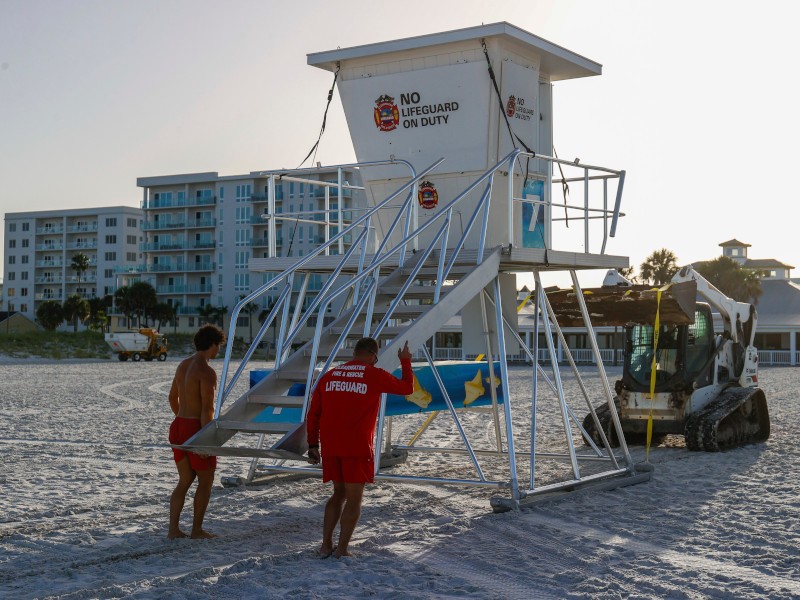MIAMI (AP) — A tropical depression over Cuba is growing better organized, forecasters said Saturday, and is likely to bring drenching rain and coastal flooding to much of Florida's Gulf Coast.
The storm strengthened into a tropical depression late Friday, and is expected to become a tropical storm by Saturday night, once it has maximum sustained winds of 39 mph (63 kph) or more. If the depression reaches tropical storm status, it would be named Debby, the fourth named storm of the Atlantic hurricane season.
Circulation was centered near Havana on Saturday morning, but associated wind and thunderstorms were spread out over a broad region, including southern Florida, the Florida Keys and the Bahamas.
The National Hurricane Center in Miami forecasts that the depression will strengthen as it curves northward off the southwest Florida coast, where the water has been extremely warm, with temperatures approaching 92 degrees Fahrenheit (33 Celsius) this week.
System expected to come ashore as a tropical storm
Predictions show the system could come ashore as strong tropical storm late Sunday or early Monday and cross over northern Florida into the Atlantic Ocean, where it’s likely to remain a tropical storm threatening Georgia and the Carolinas early next week. Tropical storm warnings are posted for most of Florida’s west coast and the Dry Tortugas. A hurricane watch is posted for parts of the Big Bend, recognizing that there is a chance that Debby could reach hurricane status before coming ashore.
On Saturday morning, forecasters expanded the hurricane watch area westward to Indian Pass in the Florida Panhandle. A warning means storm conditions are expected within 36 hours, while a watch means that storm effects are possible within 48 hours.
Tropical storms and hurricanes can trigger river flooding and overwhelm drainage systems and the region’s canals. Forecasters are warning of 5 to 10 inches (125 mm to 250 mm) of rain, which could create “locally considerable” flash and urban flooding. Forecasters are also already warning of moderate flooding for some rivers along Florida’s West Coast.
Some of the heaviest rains could actually come next week in a region along the Atlantic Coast from Jacksonville, Florida, north through Savannah, Georgia and Charleston, South Carolina.
Flat Florida is prone to flooding even on sunny days when so-called king tides surge in coastal areas, saying the storm is predicted to push up storm tides of 2 to 4 feet (0.6 to 1.2 meters) along most of Florida's Gulf Coast, including Tampa Bay, with a higher tide of 3 to 5 feet predicted farther north in Florida's sparsely populated Big Bend region. Forecasters issued a storm surge warning on Saturday, saying there's “a danger of life-threatening storm surge inundation” in a region that includes Hernando Beach, Crystal River, Steinhatchee and Cedar Key.
At least two locations in the Florida Keys island chain reported sustained winds of 30 mph (48 kph) at times on Saturday morning, but a tropical storm watch for the northern Keys were dropped. On Saturday morning, conditions were windy and squally on Long Key, but Scott Battle, operator of Florida Boy Bar and Grill, pronounced things as “fine.”
“It's spitting off and on and blowing a little, but not too bad,” he said by phone.
Preparations are underway in Florida to guard against flooding
People in some Florida cities on Friday filled sandbags to protect against possible flooding. Florida Gov. Ron DeSantis declared a state of emergency for most Florida counties, extending from the Florida Keys up through Central Florida and the Tampa Bay region and into the western Panhandle.
Christina Lothrop is the general manager at Blue Pelican Marina in Hernando Beach, a barrier island about 50 miles (80 kilometers) north of St. Petersburg. She said Saturday still seemed like a regular summer day, with the public ramp across the street jammed with people launching boats and people filling local bars and restaurants.
“Today it’s kind of normal, which is kind of weird,” Lothrop told The Associated Press by telephone.
On the other hand, Lothrop said workers at her marina have been getting ready for the storm since Tuesday. They’re securing boats that are stored on racks, stowing away tool boxes, and tying down anything that could blow around.
“Right now what we’re doing is mostly tying up boats,” she said, saying no boats would be left in the water to guard against them coming untied and drifting away or causing damage.
Before the marina store closes Saturday, Lothrop said she will lift computers up off the floor and sandbag and tape doors. She said she mostly fears a storm surge. Last year’s Hurricane Idalia pushed about a foot of water (30 centimeters) into the store.
On Friday, crews pulled floating cranes away from a bridge construction project across Tampa Bay, lashing together 74 barges and 24 floating cranes and anchoring them to try to hold them in place until the storm passes, project engineer Marianne Brinson told the Tampa Bay Times. Crews also laid down cranes on land on their sides.
For some Floridians, the name Debby summons up bad memories of a 2012 tropical storm of the same name that caused $250 million in losses and eight deaths, including seven in the Sunshine State. That storm dumped torrential rains all up the Florida Gulf Coast into northern Florida, including an astronomical 29 inches (730 mm) at a location south of Tallahassee.
Rick Falkenstein, who owns Hurricane Seafood Restaurant in St. Pete Beach, told WTSP-TV that he remembers “the high tides, the flooding” from that storm.
Pinnellas County crews paused a $5 million beach renourishment project necessitated in part by erosion from past storms.
Meanwhile, far off Mexico’s western coast, Hurricane Carlotta continued moving westward, deeper into the Pacific Ocean on Saturday, with top sustained winds reaching 90 mph (145 kph). The hurricane center said Carlotta may strengthen a little more, but should begin losing strength on Sunday as it moves into an area of unfavorable winds and drier air. The storm is likely to dissipate into a remnant of thunderstorms in three to four days. No watches or warnings are in effect.









